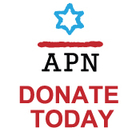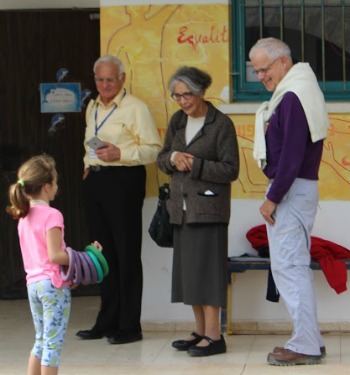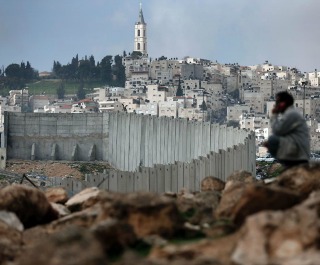 As part of an ongoing series, APN is running this message this week in the Washington
Jewish Week and the Baltimore Jewish Times from former Shin Bet Director Yuval Diskin .
As part of an ongoing series, APN is running this message this week in the Washington
Jewish Week and the Baltimore Jewish Times from former Shin Bet Director Yuval Diskin .
You can support additional ads by donating here.
 As part of an ongoing series, APN is running this message this week in the Washington
Jewish Week and the Baltimore Jewish Times from former Shin Bet Director Yuval Diskin .
As part of an ongoing series, APN is running this message this week in the Washington
Jewish Week and the Baltimore Jewish Times from former Shin Bet Director Yuval Diskin .
You can support additional ads by donating here.
Today is Giving Tuesday, and I am writing to ask you to consider donating to
Americans for Peace Now and to Israel’s Peace Now movement, two organizations that work together to advance the
liberal values championed by the founders of both the U.S. and Israel.
I just returned from Israel after an exciting week with APN’s annual Israel study tour.
During my stay there, I had dozens of conversations with progressive Israeli friends. All of them – in one way or another, sometimes basking in schadenfreude – welcomed me to their club.
Newsweek: November 23, 2016
“With the election of Donald Trump, the two-state solution is at stake” Peace Now's Anat
Ben-Nun discusses the imminent threats to the two-state solution posed by the Trump Administration
Times of Israel: November 18, 2016
“Illiberal Support for Israel: Antithetical to Jewish Values & Israel’s Interests” APN's
Lara Friedman challenges the actors within the American Jewish community that are prioritizing land over peace,
security, and core Jewish and American values
Haaretz: November 24, 2016
“Five Tips for Jewish Resistance: How to be Bannon’s Worst Nightmare,” Bradley Burston’s
op-ed lists Americans for Peace Now among the American Jewish groups engaging in active resistance against
Bannon.
Hawaii News Now: November 23, 2016
“Trump win could give Israel freer hand with Palestinians,” cites Peace Now data projecting
that the settlement housing construction started during Obama’s term will exceed that of George W. Bush’s
presidency.
Jewish Telegraph Agency: November 22, 2016
“Jewish groups fret as Republicans retreat from two-state solution,” in contrast to AIPAC’s
removal of a reference to the two-state solution, Americans for Peace Now and other pro-Israel groups remain
outspoken in advancing two states.
The Washington Post: November 20, 2016
“Even Israel says this Jewish settlement is illegal – now comes the showdown,” Amona settlers
claim “Palestinians never would have made a peep of complaint, were it not for left-wing Israeli activists, from
groups such as Peace Now and Yesh Din, who supplied the lawyers.”
Haaretz: November 19, 2016
“Jewish Leaders Across America Deliver Warning Letter to Trump: We Will Not Sit Idly By,”
Americans for Peace Now and other American Jewish organizations sent a letter to President-elect Donald Trump
denouncing the anti-Semitism surrounding his campaign, expressing concern for the plight of minorities, and
urging the new administration to uphold the two-state solution.
Times of Israel: November 19, 2016
“Liberal Jewish groups to Trump: Condemn anti-Semitism, dump Bannon,” in a letter from J
Street, New Israel Fund, and Americans for Peace Now, among others, the President-elect is urged to back
two-state solution.
Jewish Telegraph Agency: November 18, 2016
“Right-wing critics take aim at Keith Ellison’s Israel record, Jewish left-wingers rally to his
defense,” Americans for Peace Now, among other Jewish groups, have defended Keith Ellison, particular from
attacks from the Zionist Organization of America for his support for a cease-fire in 2014 and putting pressure
on Israel to loosen the blockade on Gaza in 2009.
Ynet News: November 16, 2016
“Regulation Bill draws protests outside Bennett’s home,” dozens of Peace Now activists
demonstrated outside Education Minister Naftali Bennett’s home in protests against the Regulation Bill, which
aims to legalize outposts in the West Bank built on privately owned Palestinian land.
Jewish Press: November 14, 2016
“Peace Now Against Amona Bill,” Peace Now plans to petition the High Court against the Amona
Regulations Bill, denouncing it as illegal.
Al Jazeera: November 14, 2016
“Israeli committee approves bill legalizing outposts,” Peace Now denounces the approval of
the Regulations Bill, which could retroactively legalize 2,000 settlement homes.
Yossi Alpher is an independent security analyst. He is the former director of the Jaffee Center for Strategic Studies at Tel Aviv University, a former senior official with the Mossad, and a former IDF intelligence officer. Views and positions expressed here are those of the writer, and do not necessarily represent APN's views and policy positions.
This week, Alpher discusses what we have learned from Israel's recent emergence from a week of battling massive forest fires; climate change as a national security issue for Israel; "pyro-terrorism;" the state of Israel’s emergency services; the strategic significance of all this regional and international aid to Israel for the fires; and how significant is Sunday's IDF clash with an ISIS force on the Golan.
 Jewish and Arab students celebrated “Tolerance Day” when we visited Bridge Over the Wadi, the
bilingual elementary school in the Israeli Arab town of Kufr Kara. This extraordinary school is one of a handful
statewide, in which Jewish and Arab kids study and socialize in Hebrew and Arabic, learn about each other’s
culture and narrative, and build common ground.
Jewish and Arab students celebrated “Tolerance Day” when we visited Bridge Over the Wadi, the
bilingual elementary school in the Israeli Arab town of Kufr Kara. This extraordinary school is one of a handful
statewide, in which Jewish and Arab kids study and socialize in Hebrew and Arabic, learn about each other’s
culture and narrative, and build common ground.
“How is ‘Tolerance Day’ different from any other day here,” I asked the school’s principal, Dr. Hassan Aghbaria. “That’s a good point,” he laughed, “we teach and experience tolerance every day, year round.”
Dr. Aghbaria’s school is one of six bilingual schools throughout Israel, run by Hand in Hand, the Center for Jewish-Arab education in Israel. The one in Kufr Kara is the only place in Israel where Jewish parents take their children, every day, to a school in an Arab community.
To understand how unusual these schools are, one must realize how segregated Israel’s school system is, and how segregated Israeli society is. Jewish and Arab students attend separate schools, where separate curricula are taught. Jewish and Arab citizens hardly socialize. They hardly get together. “What we have in this school is a virtual environment. Everything outside is segregated, while everything inside our school is integrated,” Principal Aghbaria told participants in APN’s Israel study tour who visited his school mid-November. The challenge, he said, is to extend this environment beyond the school, beyond Kufr Kara, and beyond the five elementary school years that students attend.
 With the election of Donald Trump as the next president of the United States, speculation is
running high in regard to Washington’s policy on Israeli settlement construction and the future of the Middle
East peace process.
With the election of Donald Trump as the next president of the United States, speculation is
running high in regard to Washington’s policy on Israeli settlement construction and the future of the Middle
East peace process.
While many unpredictable variables are in place, one thing is certain—the viability of the two-state solution is at stake. After 50 years of occupation and as the point of no return grows closer, Trump’s administration is set to carry an even heavier responsibility on its shoulders than previous U.S. administrations.
When it comes to Trump’s settlement policy, I argue that instinctual assumptions of reckless Israeli settlement construction in the West Bank during his presidency may be misleading. Unfortunately, the likely alternative also contains substantial risks for the two-state solution.
Celebrating Trump’s election, the Israeli right-wing was single-minded. It was not worried about democratic values, nor was it concerned with pluralism or for the American Jewish community. Rather, it expected that starting from January 20, all restraints on settlement construction would be removed. Without restraints from either Trump or Prime Minister Benjamin Netanyahu, continued settlement developments will create irreversible damage to the two-state solution.